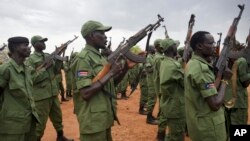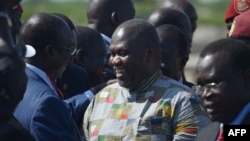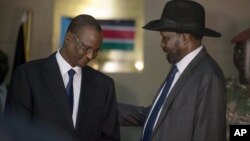Troops loyal to Riek Machar, South Sudan’s former first vice president, currently in the Democratic Republic of Congo (DRC), would be welcome in South Sudan areas controlled by the Sudan People’s Liberation Army in opposition (SPLM-IO), says Machar spokesman James Gadet Dak.
This, following a military confrontation in South Sudan between opposing forces loyal to President Salva Kiir and his former first vice president in the capital, Juba.
Dak’s comment came after the government in Kinshasa, citing security concerns, reportedly told the United Nations peacekeeping force in the DRC (MONUSCO) to remove about 750 troops loyal to Machar from its territory.
The troops accompanied Machar who crossed into the DRC where he was rescued and given medical attention by the U.N. mission. He is currently in the Sudanese capital, Khartoum, but his troops who have been disarmed, remain in the DRC.
The U.N. mission is providing shelter to the SPLIM-IO troops, near Goma, in the North Kivu province in the DRC. Residents in North Kivu express concern that the presence of SPLM-IO troops is creating tension. They say national troops from South Sudan could attack the area because of the presence of troops loyal to the former first vice president.
“Our forces do not intend to stay longer in the Democratic Republic of Congo. They went there to accompany Dr. Riek Machar when he was chased across the border and he was also airlifted and relocated to Sudan where he is now," Dak said. "So the forces were supposed to follow him to come back to our liberated areas in our headquarters in Pagak. So if the United Nations can do that, then we have no problem about that.”
Fears of renewed civil war
Last month, Machar called for an armed struggle against Kir's government, a move observers say could mark a resurgence of the country's civil war. This, following a statement after a meeting in Khartoum of Machar’s SPLM-IO.
Critics say the call demonstrates that Machar is not a statesman as he claims. They contend that the conflict could worsen the plight of the South Sudanese, many of whom have been forced to flee their homes to become internal refugees or flee to neighboring countries. Machar has stated that there is a need to restore peace to South Sudan, that people have suffered enough.
Opponents say Machar should be prosecuted at the International Criminal Court for war crimes and crimes against humanity if he engages in any military confrontation with the government in Juba. Kiir and Machar signed a peace agreement in August 2014 to end South Sudan’s more than two years of civil war.
Spokesman Dak says Machar is not to blame for the current crisis in South Sudan.
“The fighting has been imposed on him and on the SPLM-IO. You know what happened on the 8th of July when he was nearly killed … where he was chased into the bush causing him to cross into the DRC," he said. "And President Salva Kiir’s forces have continued to attack our forces in the country….There is no SPLIM-IO party now with the government led by President Salva Kiir to implement the peace agreement in Juba. And there is no transitional government of national unity…. So, what we are doing is to resist him. It is a self-defense in response to the war declared by President Salva Kiir on us.”
'Right to self-defense'
“The [prosecution] should go to President Salva Kiir who has violated the peace agreement… We know that war is not good because it would cause further suffering for the people of South Sudan, but what do we do when Salva Kiir has been attacking our forces? So, we naturally have the right to self-defense… What we are saying is that what we want is to resuscitate the peace agreement itself so that it goes back to normal, plus the redeployment of a regional protection force. If this can be done, then we can see a way forward,” Dak added.
Dak insists Machar remains the legitimate first vice president, even after Kiir replaced him in July with Taban Den Gai. East African regional groups and the international community appear to back his appointment as the country’s first vice president to partner with Kiir in the implementation of the peace agreement ahead of an election.
“This is where the international community has gone wrong. The regional body IGAD [Intergovernmental Authority on Development], which mediated the peace agreement, itself has gone wrong, because they should have made sure that there is no violation [of] the peace agreement," Dak said. "The legitimate first vice president according to the agreement is Dr. Riek Machar, and anything done illegally should not have been endorsed by the region or the rest of the international community.”






